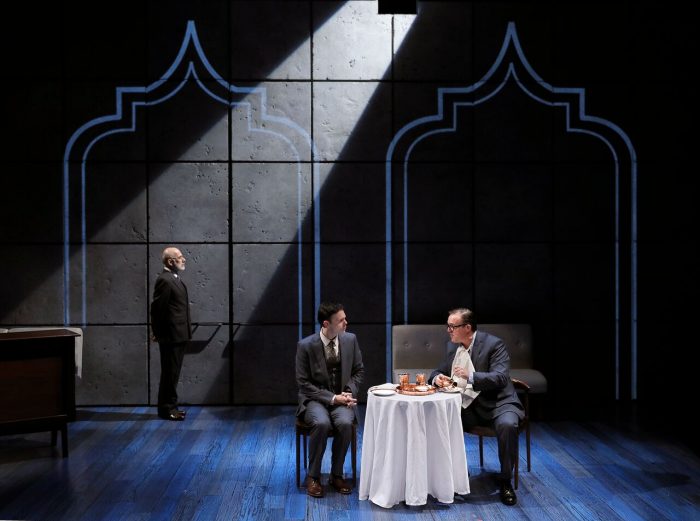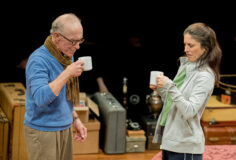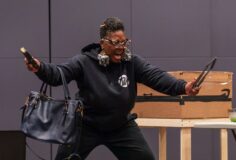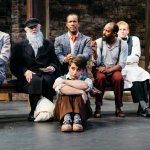In recent years, a number of playwrights have appeared who write about Middle Eastern/South Asian lives and culture, through the perspective of being Muslim. Rajiv Joseph, Ayad Akhtar, and Yussef El Guindi have achieved success and recognition with work that has won awards and been staged in theaters all over the world, including Seattle, a city where El Guindi actually resides and frequently premieres his work.
Part of the interest in Islamic characters can obviously be traced to the relatively recent cultural awakening that stories being told in Western media need to expand beyond art that features/focuses only on the lives of white, Euro descent characters and themes. And, obviously, American involvement in the Middle East and Islamic cultures both good (but mostly not so good…) over the last 70 years is a part of this trend as well, certainly more so in a post 9/11 and “War on Terror” World centered on nearly 30 years of active conflict with Islamic countries or meddling behind the scenes with diplomacy that’s more based in subterfuge than human rights.
Currently, two plays are being staged in Seattle that feature stories firmly rooted in the Middle East and the West’s intrusion in the Islamic World. One play just completely fails on almost every count while the other is interestingly odd and more authentic, at least in terms of authorship and viewpoint.
We are going to start with the more authentic…it’s Yussef El Guindi’s one act HOSTAGES, an early work being staged by the Radial Theater Project at 18th and Union. It’s a three hander set in an undisclosed Middle Eastern country in a never confirmed time frame and focuses on two white American men being held captive by unknown captors, one of whom we do eventually meet.
Meadows and Ted are 30ish academics who have been captured and now find themselves chained to a radiator. Meadows is a verbose bag of wind who nervously rattles on and on about…well, a lot of different subjects including revealing his rather sordid reasons why he’s teaching abroad in a country where he doesn’t respect the people or the culture. Ted on the other hand, is just the opposite…determinedly silent and not prone to revealing much about himself other than rather quickly revealing he doesn’t care for Meadows and deliberately calls him by the wrong name. Eventually, we do learn more about Ted, including his passionate feelings about experiencing this culture.
So, Hostages is essentially an hour and ten minutes or so of these two men revealing things about themselves and trying to form some kind of relationship to get through this horrible experience with the final 10 minutes or so dealing with the men interacting with their captor. The confrontations between the characters are interesting (and sometimes hard to listen to; there’s some tough subject matter here and Meadows really is an asshole). It’s also a terrific acting exercise for the two actors playing Meadows and Ted and both Nik Doner as the extroverted Meadows and Sam Hagen as the quieter Ted give solidly compelling performances that feel very organic and natural. The actors, under the assured direction of David Gassner, always engage and connect with each other and the audience.
Now for the $100,000 question…does Hostages really go anywhere or say anything profound?
To be honest, I don’t know. Maybe? Part of the problem is the fact that the two main characters are never more fully developed than “Ugly American” and “Bleeding Heart Liberal”. Maybe part of that problem is that Hostages is not a new work by Mr. El Guindi; it’s an earlier work and it shows. There’s a certain jejune quality here, an over reliance on “bits” to propel the plot, including a lot of toilet humor and a bit of knee jerk homophobia involving intimacy between Meadows and Ted. The play does display Mr. El Guindi’s talent for language but Hostages really does frequently feel more like an excuse for actors to stretch their muscle than an actual well thought out play.
And, it should be noted that the third character, the young Middle Eastern man holding them captive isn’t given the same “big” opportunities as the two main characters…he just feels like a device. (But, actor Yusef Mahmoud does a good job of fleshing out this ambiguous character; he embodies the Guard with enough “flesh” that you really do want to learn more about who this character is.)
Hostages is interesting as an acting exercise but feels unfulfilled despite the fact it actually is a work of theater by a writer of Middle Eastern descent. It’s worth seeing for the acting and for comparing it to later more fulfilled works by Yussef El Guindi.
Review: Hostages by Yussef El Guindi. Produced by Radial Theatre Project. Directed by David Gassner. Fight Choreography by Ryan Spickard. Lighting Design by Angelo Dometri. Costume Design by Julia Evanovich. Sound Design by Evan Mosher. With Nik Doner, Sam Hagen and Yusef Mahmoud. Now through November 3, 2018 at 18th and Union/Capitol Hill.

Victor Pappas, Avery Clark and Mike Dooly in OSLO at ACT through November 11, 2018. Photo: Chris Bennion.
So.
Now to the work of theater which concerns itself with Middle Eastern politics, the 1993 peace talks between the Palestinian Liberation Organization and Israel but seen pretty much entirely through the eyes of European characters, and specifically the Norwegian diplomatic couple who put together the secret negotiations in a villa outside OSLO, which also serves as the title of this award winning play by American playwright J.T. Rogers currently onstage at ACT.
Oslo was a darling of the 2016/17 Broadway season and won strong reviews and a slew of awards including the Tony Award for Best Play, beating out some strong competition: Lucas Hnath’s A Doll’s House, Part 2 (coming soon to Seattle Rep) and two highly acclaimed works by female writers: Paula Vogel’s Indecent and Lynn Nottage’s Sweat which won the Pulitzer Prize for Drama that year. But, Oslo also has received its fair share of controversy for focusing a story about peace talks between Israelis and Palestinians through Eurocentric eyes. The play is not very popular with Palestinians and many Islamic people who accuse the play of being pro-Israeli, portraying more Israeli characters and featuring those characters in a more positive light at the expense of the Palestinian characters. (Five Israeli characters are featured onstage in Oslo to two Palestinian).
Oslo is Norwegian-centric with most of the scenes set in that country. The opening scene sets the stage at an intimate get together between real life married couples, Terje Rød-Larsen and his wife Mona Juul and Mona’s brand new boss Norwegian Foreign Minister Johan Jorgen Holst and his wife Marianne Heiberg who works with Terje at the same think tank (there’s actually a running joke in the play about Norway being a very small country where everyone is interconnected). As we eventually discover later in the play, this opening scene is actually a flashback; later on we ‘catch up’ to this point in the story, as we learn how Terje Rød-Larsen and Mona Juul opened up the secret back-channel talks between Israel and the PLO while the official talks were going on elsewhere. The pair work on convincing reluctant Israeli and Palestinian diplomats to agree to the talks and gradually put together the series of meetings that led to the final Oslo Accords…and, Israeli Prime Minister Yitzhak Rabin, Israeli Foreign Minister Shimon Peres, and PLO Chairman Yasser Arafat all winning the Nobel Peace Prize in 1994 despite the fact that the Norwegians and lower level diplomats did all the actual work…
So, Oslo is basically a three hour, three act history play (most of the characters are real people and many of the events are factual or composites) that requires 14 actors to portray more than 20 roles. It’s a big award winning play with big ideas and themes and some clever dialogue and interesting characters and interactions and it’s….
A bit of a flop.
It’s weirdly cast. The staging isn’t compelling. It’s too long and talky. And, problematic….why are we seeing the Israeli-Palestinian Conflict through the eyes of white, Northern Europeans? In 2018, haven’t we moved past the need to frame everything through a lens that only your average white, upper middle class, retired suburban couple/typical regional theater subscriber will relate to?
So, the play itself is problematic, and despite some smart dialogue at times, it’s not an especially brilliant play in form and structure. I can only guess that Bartlett Sher’s direction of the original New York production was profoundly brilliant enough to compel Tony Award voters to give J.T. Rogers the Tony for Best Play….because, it’s not apparent in ACT’s production directed by its Artistic Director, John Langs. His staging is all over the place as we bop back and forth in time and place while actors switch personas and costumes. Yes, this is all written into the play but this direction of the material isn’t clarifying anything. It’s all so incoherent and sloppy with my favorite bit being a scene featuring a walk in the woods between two opposing characters that includes all the furniture from the previous indoor set scene….there are 12 other actors around; couldn’t someone have taken away those pieces? Or, do Norwegians like setting IKEA furniture set out in the woods as some slur on Swedish retail furniture craftsmanship?
Then, there’s the mostly locally centered casting of actors frequently cast in Langs’ productions but not necessarily the best actors for their roles. And, don’t get me wrong, there are VERY talented actors in this show but not everyone in it is good at accents…not to mention the lack of diversity here is a problem that really could only have been solved by casting more suitable actors from out of town.
Let’s face it: Seattle doesn’t have a large pool of Israeli and Palestinian actors or even culturally/ethnically adjacent actors appropriate for many of these roles. It’s not Seattle’s fault; we’re a smaller market and frankly, despite some recent changes, still a community with more opportunities for actors of a more northerly European persuasion (PLENTY of folks around to play Norwegians!)
To be honest, I’m not sure why ACT is doing this play. They were apparently not able or willing to cast outside Seattle and pay for the expense of bringing in more appropriate actors. And, this huge cast apparently resulted in a budgetary need to program so many solo and small cast shows for the rest of their season. To be frank, ACT’s 2018 season was a huge disappointment that featured one production really worth seeing (last spring’s excellent The Wolves, directed by Sheila Daniels) and the rest being bland and not very persuasive. It’s a meh play that was a huge drain on ACT’s resources…why do it other than to crow about producing a “Tony Award Winner!”?
On the positive side, Oslo does have a few good things going for it…I like Duane Shuler’s lighting design and L.B. Morse’s projections which give the play some zip and a feel of the cinematic. I think the play would drag without them.
Of the ensemble, I liked both of the actors playing the Palestinian characters very much; Victor Pappas and the imported from Los Angeles actor, Wasim No’mani lent an actual sense of authenticity to the material and gave fine performances of characters that are never fully developed or made very real. And, Kate Witt made much of a couple of small roles, including a really ridiculous Norwegian cook that charms the world and brings peace…through waffles.
(Eye roll)
I also very much liked Christine Marie Brown and Avery Clark as Mona and Terje, though Mr. Clark is way too young (looking) for his role. They grounded the piece, even at its ridiculous climax as the two gaze longingly at the dawn of a new peace, so literally staged you wanna throw up.
Oh, and that “new peace” really never happened. Gaza is still a hellish symbol of apartheid that’s a terrifying reality for the Palestinians who live there.
The Oslo Accords were ultimately meaningless…much like Oslo, the play.


















